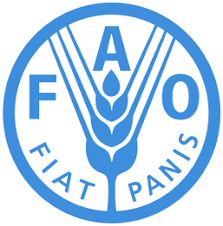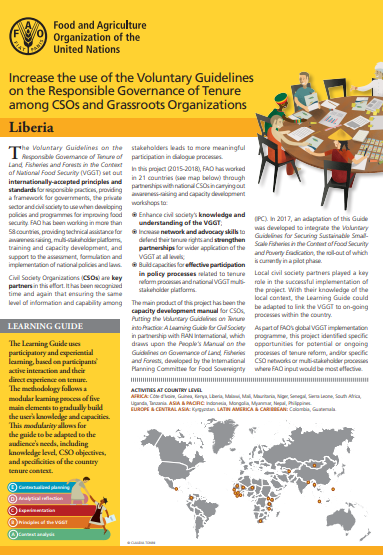Focal point
Location
The Food and Agriculture Organization of the United Nations leads international efforts to defeat hunger. Serving both developed and developing countries, FAO acts as a neutral forum where all nations meet as equals to negotiate agreements and debate policy. FAO is also a source of knowledge and information. We help developing countries and countries in transition modernize and improve agriculture, forestry and fisheries practices and ensure good nutrition for all. Since our founding in 1945, we have focused special attention on developing rural areas, home to 70 percent of the world's poor and hungry people.
Members:
Resources
Displaying 611 - 615 of 5074VGGT: E-learning Centre
About the e-learning courses
All our courses are designed for self-paced learning, and offered free of charge.
Increase the use of the Voluntary Guidelines on the Responsible Governance of Tenure among CSOs and Grassroots Organizations_Liberia
The Voluntary Guidelines on the Responsible Governance of Tenure of Land, Fisheries and Forests in the Context of National Food Security (VGGT) set out internationally-accepted principles and standards for responsible practices, providing a framework for governments, the private sector and civil society to use when developing policies and programmes for improving food security.
Land resource planning for sustainable land management. Current and emerging needs in land resource planning for food security, sustainable livelihoods, integrated landscape management and restoration
A review of needs at various scales for tools and processes that can help countries and stakeholders meet emerging challenges, address increasing degradation of and competition for resources, support the sustainable use and restoration of land and water resources, and ensure resilient ecosystems.
Valuing land tenure rights. A technical guide on valuing land tenure rights in line with the Voluntary Guidelines on the Responsible Governance of Tenure of Land, Fisheries and Forests in the Context of National Food Security
Valuations of tenure rights are required by the State and by the private sector for a wide variety of reasons, often forming and informing the basis of transactions, taxation, compensation and accounting. Value and the valuation process form a part of our everyday lives, and yet these are often shrouded in mystery and are not clearly understood.










